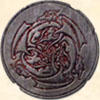Lyon Estates
This small barony on the western edge of Drillian was established in 185 SKR by Queen Maribel Eustace appointing Nielborn Lyon as Lord of the territory. Over the next ten years he created a space for farmers out of the wilderness. During the Third Drillian Civil War Nielborn Lyon chose to side with the rebels. Nielborn Lyon's grandson Jolen Lyon was chosen to be the fourth Royal Consort to Queen Weilina Mosskin in 216 SKR. Jolen Lyon died that same year after eating a poisoned dessert that was intended for the Queen. Queen Weilina Mosskin honored the family by granting the title of Baroness to Jolen's sister Melody.
Early in the year 274 SKR when The Mist reached north across the Estate many of the farms in the area failed. Baron Sualt Lyon worked feverishly, bringing in Druids from far off Hallstatt and working with priests from both the Suomi faith of his family and the Kayugan faith to attempt to solve the problem of growing crops under the blight of The Mist. Through the costly efforts of Baron Lyon the southern portion of Drillian was again able to raise crops to feed their people. With his own farmer's able to benefit from these advances first some were able to turn to raising things other than food crops. Acres of flowers allowed the apiaries to produce Lyon Honey fit to be served to the Queen.
The Barony of Lyon is a small, relatively obscure land of no strategic value and little current political importance. However the rich loam combined with the superb local skills, make this region a perfect locale for growing tulips. Indeed, these flowers are now the number one export of the small estate, and the people are fiercely proud of their horticultural skill. The first bulbs of a new species of tulip have fetched prices as high as 25,000 gp each from larger, more powerful estates and have been sought after from as far away as Terraguard. The revenue generated from the sale of these flowers provides luxuries and other supplies to the estate.
That such valuable bulbs have attracted the attention of thieves throughout the land comes as no surprise. More than once in Lyon's history has a new bulb been stolen and sold to the highest bidder. But apart from these independent fortune-seekers, there are other, more sinister thieves at work. Competition among tulip-fanciers is fierce. Because the bulbs are self-reproducing, a new breed is valuable only for three to five years. After this time, there are enough bulbs of the species to make it "commonplace." Foreign buyers pay for rarity. This pressure to breed new varieties for export is so great that many horticulturists employ spies to gather information on the progress of their colleagues, for success brings much prestige to the individual tulip-breeder. Theft of notes, sabotage of flower beds, and even murder are not uncommon occurrences in the otherwise peaceful realm. In short, the tulip-fanciers of Lyon are deadly serious about their work.
Blazon of Tulip and Beehive - blue tulip above a gold beehive on a grey field
Sworn Noble Estates to Baron Lyon
- Dosyth
- Lysund
- Otmahn
Village of Hrocby
